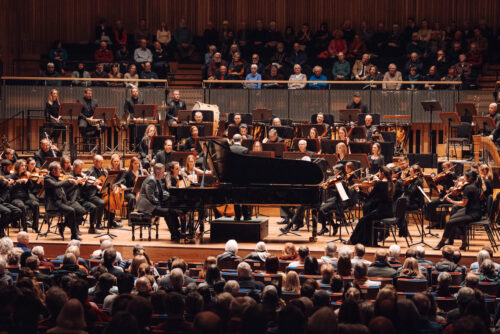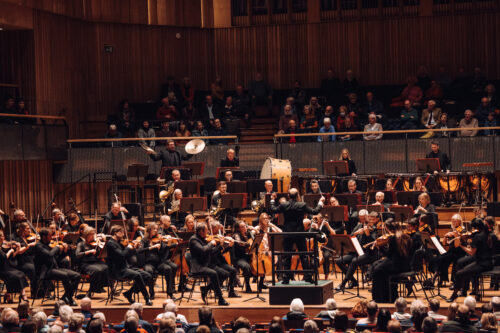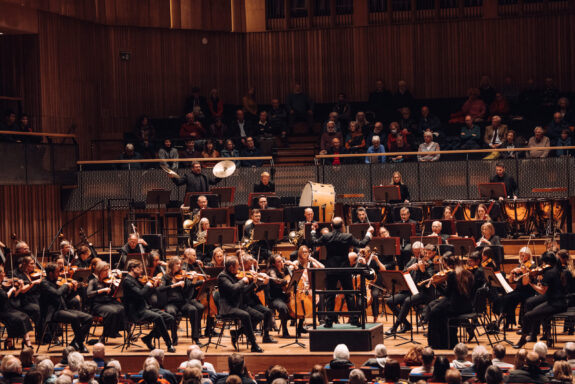 United Kingdom Wagner, Ravel, Walton: Nicholas McCarthy (piano), Bournemouth Symphony Orchestra / Mark Wigglesworth (conductor). Bristol Beacon, 21.11.2024. (CK)
United Kingdom Wagner, Ravel, Walton: Nicholas McCarthy (piano), Bournemouth Symphony Orchestra / Mark Wigglesworth (conductor). Bristol Beacon, 21.11.2024. (CK)

Wagner – Overture, Die Meistersinger
Ravel – Piano Concerto for Left Hand
Walton – Symphony No.1
This eagerly-awaited concert – first given in Poole the previous night – marked the arrival of Mark Wigglesworth as Chief Conductor of the Bournemouth Symphony Orchestra.
What better way to begin than with Wagner’s Overture to Die Meistersinger? With an English overture, I hear you say: but The Mastersingers is a quintessentially English opera by adoption – we all love it and approve of its rather English mellowness, tolerance and wisdom (apart from that bit near the end). I fondly remember the BSO’s new Chief conducting it at Covent Garden back in 2002.
The Overture – which could almost have been written by Elgar – was given a lovely performance, bathed in C major sunshine, the main theme sturdy but smiling, the Apprentices perky in the woodwind, the Prize Song delicately inflected by the first violins. (Confession: I have always wanted to play that single triangle stroke with which Wagner discreetly announces ‘I am now going to combine all the themes you have heard so far. Rather fun.’ It was so discreet in this performance that it was inaudible.)
On paper, this concert followed the old-fashioned Overture – Concerto – Symphony pattern: but it didn’t feel like that at all. One of the reasons for this was the extraordinary nature of the concerto performance, and, more particularly, the pianist. It is impossible to do justice here to Nicholas McCarthy’s achievements and his continuing influence for good: born without a right hand, the only such pianist to graduate from the RCM, corporate speaker, TED talker, TV and radio presenter, brilliant musician and inspiring human being.
The Ravel Concerto for Left Hand is generally regarded as exceptionally brief, dark and concentrated, but there was a lot more to it than that in McCarthy’s performance. The sepulchral opening contrabassoon could be felt through the floor, and there was an implacable harshness to the jazzy braying of the brass (‘rasping malice’, someone called it). McCarthy was master of all the percussive brilliance the work needs; but there was fantasy too, especially in the extended passages for piano solo. At one point McCarthy seemed to lead us into the fairy garden from Ma mère l’Oye. For most concertos the orchestral forces are scaled back: but Ravel’s orchestra here fields full winds and brass – twice as many as are needed in his G major Piano Concerto – and percussion, giving it terrific punch. The conclusion was brilliant and brusque.
McCarthy told us that this performance was especially meaningful for him, since Paul Wittgenstein – his hero, and the Concerto’s commissioner – had played it with the Bournemouth Municipal Orchestra (as the BSO was then known) in 1929. As an appropriate encore he treated us to Scriabin’s Nocturne, Op.9 – written by the 18-year-old composer when over-practising had resulted in tendonitis in his right hand.

Walton’s First Symphony: a sure-fire thriller, or a difficult piece to bring off? My generation instinctively refers to André Previn’s famous recording with the London Symphony Orchestra – more than half a century old now, but hard to beat for tension and excitement. Wigglesworth and the BSO set off in the right coiled-spring manner, and throughout the eventful opening movement there was a good balance between uneasy lyricism and bite, the wailing saxophone helping to ratchet up the music’s intensity. Wigglesworth managed the difficult trick of maintaining tension through the movement’s central section and built superbly to its bitter and venomous climax: a prolonged and terrifying rictus, impelled by baleful low horns and tuba, screaming trumpets and thundering timpani. He drove it brilliantly to its brazen, brutal major-key conclusion.
A hard act to follow: hard especially for the players to sustain the dazzling footwork and whiplash aggression of Walton’s Presto, con malizia. There were flashes of malice, certainly, and the movement was dispatched with brio. The Andante – lyricism struggling to flower in an icy climate – was movingly and powerfully done, with particularly lovely playing from the oboe and the cellos: it built to a heartrending cry of sorrow and pain.
Much has been written about the jollity of Walton’s finale being unearned, but this has never bothered me. Shostakovich does much the same in his Sixth Symphony and nobody seems to mind. And anyway, as Walton pointed out, the next girl came along. A broad, measured opening; catchy rhythms; a helter-skelter fugue (which the second violins tore into with a will); and an undeniably exciting conclusion. John Wilson’s performance with the Sinfonia of London at last year’s BBC Proms culminated in a star turn by the two timpanists: that didn’t happen here, because Wigglesworth wasn’t after a firework display but a fully symphonic conclusion.
The key to this performance – and the thing that connected this finale to the preceding movements – was that it had heart. Wigglesworth and the BSO forced me to listen to the work not as a sequence of excitements but as a symphonic utterance with real depth beneath its surface brilliance, in which pools of quiet and explorations of feeling were part of the same fabric as the big moments. The orchestra were equal to everything Walton threw at them and Wigglesworth asked of them: the performance was a triumph.
A footnote. In 1995 Amsterdam mounted a great Mahler Festival to mark 75 years since Mengelberg’s pioneering Festival in 1920. The symphonies were shared out among the European orchestral aristocracy – the Berlin Philharmonic, the Concertgebouw, the Vienna Philharmonic – most of them conducted by Abbado, Chailly or Haitink. Also invited were a young English conductor, Mark Wigglesworth, and his BBC National Orchestra of Wales. The reason? To play Deryck Cooke’s performing version of Mahler’s Tenth Symphony (most of the illustrious Mahler conductors of the day having turned up their noses at it). Their performance won golden opinions. 15 years earlier, an even younger conductor – Simon Rattle – recorded this same symphony whilst working with the Bournemouth Symphony Orchestra (a performance I prefer to his Berlin Philharmonic remake). I am very much hoping that Mark Wigglesworth will perform the symphony with his new orchestra – and not only for old time’s sake.
Chris Kettle
